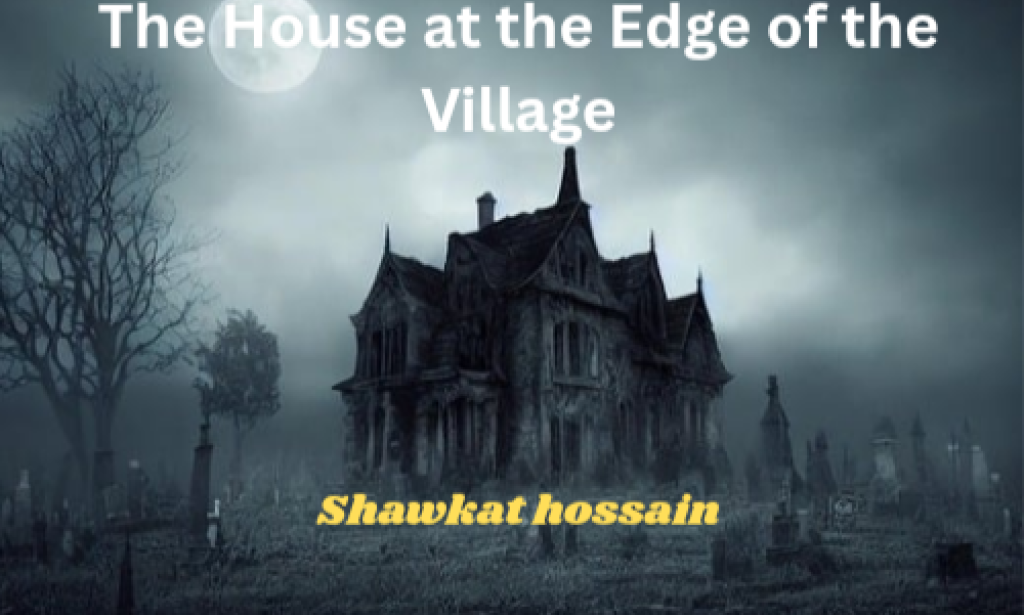"The House at the Edge of the Village"
Everyone in the village knew not to go near the old Joshi house.It stood on the northern edge, half-swallowed by the woods. The paint had peeled off decades ago.
The windows were either broken or boarded. At night, strange lights flickered behind the curtains that should have been long gone.No one lived there, not officially. But everyone said something did.
When Ramesh inherited the property, he laughed it off. “Ghosts?
Come on.” He was from the city, a software engineer between jobs. He figured he’d spend a few weeks fixing up the place, maybe sell it or turn it into a guesthouse.
The villagers warned him. Old women at the tea stall crossed themselves when he mentioned it.
The priest looked away and mumbled something about “disturbed ground.” But Ramesh had read the land documents.
There were no curses or legal issues. Just dust and superstition.So he moved in.
The first night was uneventful—just creaking floorboards, dead insects, and the smell of mold.
Ramesh set up a mattress in the main hall, cleaned what he could, and fell asleep to the sound of the wind through the cracked shutters.
At 3:13 a.m., he woke up.
The hall was pitch black. The air had turned cold, sharp, as if he’d left a window open.
But when he checked, everything was shut. He chalked it up to village weather and went back to sleep.
The second night, he heard footsteps above him. Slow. Heavy. Deliberate.
He froze, staring at the ceiling. There was no upstairs—the Joshi house had only one level.
But the steps kept going, right above his head, crossing from one side of the room to the other. Then silence.He didn’t sleep that night.
On the third day, Ramesh walked to the village temple and asked the priest—an old man with tired eyes—if anyone had ever died in the house.
“Not just one,” the priest said quietly. “The whole family. In 1983. Father, mother, two children. They burned. House caught fire, but didn’t collapse.
They say the father lit the match.”
Ramesh laughed nervously. “Sounds like a rumor.”
The priest didn’t smile. “Some things shouldn’t be repaired. Some walls remember.”Ramesh returned to the house, trying to ignore the feeling that something was watching him from the treeline.
That night, he heard whispering.
It came from the walls. Not in any language he recognized—just soft, rhythmic murmurs, like a chant. He pressed his ear to the plaster.
The whispering stopped. When he backed away, it started again.
He recorded it on his phone, but in the morning, the file was just static.
By the fifth day, things got worse.
He began seeing movement in the mirrors. Not reflections—delays.
He would leave the room, and the mirror would still show him standing there, half a second behind.
Then the reflection would smile, even when he didn’t.
He covered all the mirrors with sheets.
On the sixth day, a knock came at the door. No one from the village ever visited.
When he opened it, a little girl stood there. Barefoot, in a faded red dress, with wet hair clinging to her face.“Can I come in?” she asked.
Ramesh’s throat went dry. “Where are your parents?”
She didn’t answer. Just tilted her head and smiled.
“Go home,” he said, shutting the door.
The knocking continued all night.
On the seventh morning, he packed his bags. He’d had enough. Screw the property, screw the renovation.
Let the ghosts have it.
But when he opened the front door, it led to the back of the house.
He shut it and tried again. This time it opened into the kitchen.
He ran from room to room, door to door, but none led outside. The house had changed. It was folding in on itself like a maze.He screamed until his voice broke.
By nightfall, he was losing grip. The lights flickered endlessly, casting long, twitching shadows. He heard the footsteps again—above, below, all around.
Sometimes, he saw glimpses: a man with burned skin crawling on the ceiling, a woman with no face watching from the corner, a boy with hollow eyes sitting under the table.
And the girl.She appeared again, standing by the door with her head tilted.
“You’re part of the house now,” she whispered.
Ramesh grabbed a chair and smashed it through the window. But instead of shattering, the glass bent, like rubber, and the room filled with a low, metallic groan. The walls began to pulse, like a heartbeat.
Desperate, he ran to the center hall, where the floor had begun to rot. He tore at the wood with his hands, splinters slicing his palms. Beneath the floorboards, he found ash. Bones. Charred pieces of cloth.
The family.Suddenly, the lights cut out.Complete darkness.Then—the sound of a match striking.He turned.
In the dark stood the man—the father. Hair gone. Face blackened. Holding a lit match in his blistered hand.“You brought fire into our house,” the man said.“No,” Ramesh gasped, backing away.“You woke it up.”
The flame touched the ground. The floor ignited instantly—too fast, too bright. The fire wasn’t natural. It was hungry.Ramesh screamed.
The villagers said the fire was small. Electrical, maybe. The house didn’t burn down, but it was blackened again, just like in '83.They found no body.
The police filed it as “missing, presumed dead.” No one investigated further. No one wanted to.
The house still stands at the edge of the village.
But sometimes, late at night, if you pass by—you can hear footsteps.
And someone knocking from inside.



You must be logged in to post a comment.